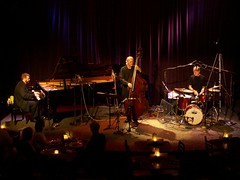By Cynthia Mullis
Whew! What a month! My head is spinning with jazz, concerts and thoughts about jazz concerts. Not to mention that I think I hurt something during my recent infatuation with playing tunes in concert E major…on the alto sax. My head is throbbing and I’ll be happy when the Aerosmith and Emmy Lou Harris tunes come up on my iPod during my walk later on today! As I start to catch up, I’ll send in a few more reviews of concerts that I’ve attended recently.

On October 22nd I heard drummer Dafnis Prieto and his group Absolute Quintet at the Triple Door. I loved the group from the first note and was thoroughly absorbed in the music, despite being very tired and hungry when I arrived for the second set. I’ll leave the deeper analysis of that concert to the true Afro-Cuban aficionados in the audience (I personally saw Fred Hoadly, Chris Stover, Ann Reynolds, Lillian Woo, Susan Pascal, Carolyn Caster, Ron Barrow, Cindy Hughen…that was just the second set). The New York Times has been raving about this guy for awhile but I’d never had a chance to hear him—check out his website at dafnisprieto.com for more information. My impression of the drummer was that he was a hurricane of poly-rhythms, intricate rhythmic melodies, freakish eight-limbed independence and true-blooded Cuban musical tradition. I enjoyed that the ensemble had a different instrumentation than usual, with the cello player straddling the line between acting as a bass player and being another melodic voice (in addition to doubling on trombone). To my ears, the violinist (whose name I didn’t catch) and the cellist gave the group a bit of a folk oriented sound while remaining completely modern. Yosvany Terry was on alto sax, soprano and shekere and was much more thoughtful and musical that when I heard him a few years ago: great alto sound, great technique and not overpowering of the ensemble. Jason Linder rounded out the group on keyboards. The music was metrically complex—I didn’t bother to attempt figuring out the time signatures—but I really appreciated was how deeply rooted in the Afro-Cuban tradition the music was without being overwhelmed by the clavé, montunos, and other aspects of this style of music. It was an exciting and fresh evening of music—I’m glad I took the opportunity to check it out and I’ll be curious to see what other people’s reaction was to this concert.
Now a little rant: as much as I love going to shows at the Triple Door, I was bummed that they raised the prices on their food and that it wasn’t as good as it has been on previous visits. Plus I know the wait staff is just doing their job, but it seemed like every time I closed my eyes to lose myself in the music, someone was tapping me on the shoulder to see if I needed anything else. Also, I’ve been a little bummed about how lately the sound at the TD tends to be boomy and washed out. I would like to hear more definition in the instruments without having to concentrate so hard. Maybe the sound issues are necessary to drown out the racket of ceaseless conversation that seems to be the norm at concerts these days, along with the commotion that comes with the enterprise of selling food and drinks. I luv ya, Triple Door, but for the number of concerts I’ve seen there recently, I’m entitled to vent a little.




 Bill Barton has posted a review of the first night of The Seattle Jazz Showcase featuring the Hadley Caliman Quintet and the Marc Seales Group.
Bill Barton has posted a review of the first night of The Seattle Jazz Showcase featuring the Hadley Caliman Quintet and the Marc Seales Group. Dave Marriott has a nice post about Dave Peck’s recent appearance at Jazz Alley with Jeff Johnson and Joe La Barbera.
Dave Marriott has a nice post about Dave Peck’s recent appearance at Jazz Alley with Jeff Johnson and Joe La Barbera.